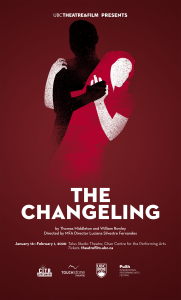Luciana Silvestre Fernandes, also the director for the upcoming The Changeling by Thomas Middleton and William Rowley, January 16 – February 1 in the Telus Studio Theatre in the Chan Centre for the Performing Arts, has received a SSRHC CGS- Canada Graduate Scholarships-Master’s Program, part of Social Sciences and Humanities Research Council of Canada (SSHRC).
The Title: Re-Claiming the Canon: A New Lens for the Staging of Middleton and Rowley’s The Changeling
The Project: research focus is on reclaiming history and period narratives. My final project will be to direct Thomas Middleton and William Rowley’s The Changeling, one of the most performed non-Shakespearean Jacobean plays, and a play with many themes that will resonate with the #metoo era: the suppression of women, power dynamics, and coercion. My aim is to unsettle the traditions associated with this play.
Canonical texts are part of our collective consciousness: their endurance over time is often related to the text’s ability to speak to a transcendent universal truth. Yet, dominant cultures determine what is considered universal, eclipsing alternate and nuanced understandings from the margins. My approach to canonical materials is to encountering these nuanced perspectives and affecting dogmatic understandings of the themes in the play. The conversations I aim to incite revolve around inclusion, the #metoo movement, and how to break cycles of abuse.
This play’s production history and scholarship have been marked by limited patriarchal interpretations. Kim Solga argues that Beatrice-Joanna’s “status as a victim of sexual violence (indeed, of any violence at all) is wholly uncertain” (146). Frances E. Dolan’s argument is that coercion is opposed to rape, and she minimizes the assault, arguing that Beatrice-Joanna uses coercion, only differently. To dismiss a woman’s assault and status as a survivor because they do not fall into a “perfect victim” category, and to exclude coercion from rape is at the core of what the #metoo movement is combating. These interpretations blame the victim and can frame sexual assault as an ultimately liberating experience– a problematic trope in many stagings of period pieces.
My goal is to do justice to Beatrice-Joanna and to the many invisible women who have had their sexual assault discredited, directing the play from her perspective, embodying the trauma that follows her assault.




